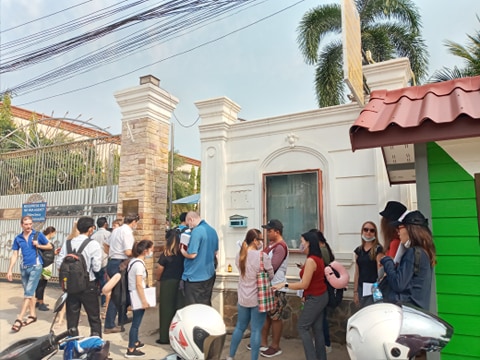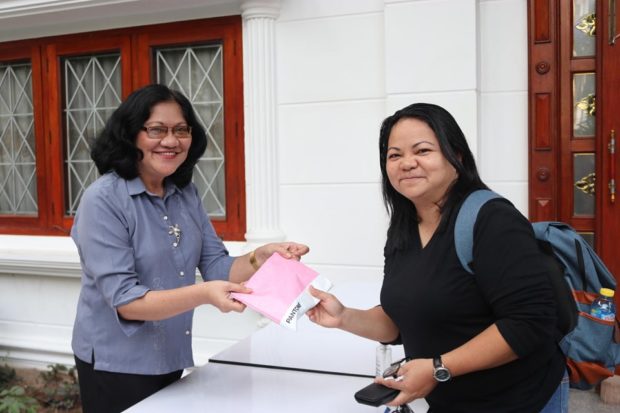Filipinos in Laos cope, prepare amid COVID-19 threat
VIENTIANE, Laos – Unlike the previous months, the Thai-Lao border in Nongkhai, Thailand is not as packed with people from various countries doing visa runs.
Earlier, Laos has closed its four immigration checkpoints in Nakhon Phanom Muang Khob in Sayaboury province in Laos bordering Thailand’s Phayao Province.
On March 19, Laos suspended all types of visas to foreign tourists including ASEAN countries effective midnight of March 20 until April 20.
The border closing has been affecting Filipinos and other migrant workers seeking visas either for work or tourism in Thailand.
Usually, foreigners seeking to work in Thailand apply for a visa at the Thai Consular Office in Laos or in Savannakhet.
“This is a new policy. Usually, the Thai Consular office in Vientiane gives tourist visas twice,” Jane (not her real name) laments.
Jane is an undocumented migrant Filipino worker in Thailand for the past four years.
She did visa runs several times. She needs to stay overnight in Vientiane so she can secure a visitor stamp for another 30 days upon returning to Nongkhai border in Thailand.
She is one of the dozens of undocumented migrant workers who were denied the 90-day tourist visa. Many of them are out of work due to the closure of business establishments and schools around Thailand.
“My child is with me. She is studying in Thailand. I don’t want to think,” Jane says.
Even tour operators were surprised by the new policy. But it was just the beginning of the impending ‘lockdown’ both countries are anticipating in the bid to contain the spread of the coronavirus disease 2019 (COVID-19).
In the Mekong Region, Laos shares borders with Vietnam to the east, Cambodia to the south, Thailand to the west, and Myanmar and China to the north.
Due to its location and frequent border crossings from neighboring countries, Laos’ is vulnerable to infectious diseases like COVID-19.
Filipino migrants in Laos, however, are assured that the Lao government and the Philippine Embassy are taking all the precautionary measures to make the land-locked country COVID-19 free.
There are around 1,600 Filipinos in Laos, of which 40 percent are teachers, the rest are development workers, IT experts and engineers.
Precautions in Laos
“On March 17, the Lao government ordered kindergarten schools to close down, Ritchelle Valerie Vargan, a principal at Achievers Kindergarten School in Vientiane, said.
On March 19, the Ministry of Education and Sports ordered the closure of all educational facilities including universities until further notice, Danang Today reported.
“Our school follows the international academic year, so we are supposed to have class until June, but the COVID forces us to cease operations, until when, we are not sure,” Vargan said.
At Rhue Pangkham Namphou Fountain and Square in the city center, the night has been slow. There are few tourists drinking and listening to the live band at the park.
The stretch of Chao Anou road going to the Mekong Riverside is nearly empty.
Yosef, a Lebanese restaurant owner, is still optimistic that business will be better in the coming days despite the border closures.
Philippine Ambassador to Laos and Dean of the Diplomatic Corps, Belinda Ante, says that the embassy is coordinating with other embassies in case of a worst case scenario.
“At this stage, we are still in the precautionary measures,” Ante, said.
As early as January, embassies have been discussing measures to combat COVID-19.
The Philippine government has allowed embassies to procure emergency equipment like thermal scanner, and hygienic kits.
The Philippine Embassy gave away 250 hygiene kits to commemorate the Women’s Month as well as to raise awareness on COVID-19. The kits contained face masks, ethyl alcohol, spray bottles, and wet wipes.
It also included a flyer listing the preventive measures to avoid contracting COVID-19.
“When we talk of emergency, it may mean wars, or floods. But now it is different,” Ambassador Ante, said.
For more news about the novel coronavirus click here.
What you need to know about Coronavirus.
For more information on COVID-19, call the DOH Hotline: (02) 86517800 local 1149/1150.
The Inquirer Foundation supports our healthcare frontliners and is still accepting cash donations to be deposited at Banco de Oro (BDO) current account #007960018860 or donate through PayMaya using this link.

